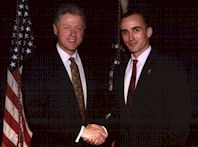 |


AIDS-related Question Gets a Subscriber Booted Threatens Reporter with Loss of his AOL Account |
|
Compiled By GayToday Courtesy of Wired Strategies
 Washington, D.C. - On Sunday July 25, America Online (AOL) kicked a man out of a gay-oriented chat room for asking a question about safe sex, according to three witnesses present at the time. A transcript of the chat obtained by Wired Strategies indicates that AOL employee "Guide RBT" suspended the gay member's chat privileges because his HIV-related question contained "sexually explicit language," violating AOL's Terms of Service (TOS).
Washington, D.C. - On Sunday July 25, America Online (AOL) kicked a man out of a gay-oriented chat room for asking a question about safe sex, according to three witnesses present at the time. A transcript of the chat obtained by Wired Strategies indicates that AOL employee "Guide RBT" suspended the gay member's chat privileges because his HIV-related question contained "sexually explicit language," violating AOL's Terms of Service (TOS).
National AIDS groups immediately criticized AOL's actions. "AOL should be more concerned about public health than policing naughty words," said Daniel Zingale, executive director of AIDS Action in Washington, DC. "No one should be discouraged from seeking online information about HIV and AIDS prevention." The incident arose in the "Ask Gay Guy Anything" chat room when Dave, a 33-year-old gay man from California, posed a question about the risk of HIV infection of a specific sex act. "Does the hiv virus weaken at all once it hits the air?", Dave asked the room. He indicated he was embarrassed to complete his question, but after prodding from the room's members, wrote: "ok had sex 1st time with a man and he came on my back then 1 min later he put his finger up my anus with cumm on it." The guide immediately intervened, telling Dave: "sexually explicit language is a violation of the Terms of Service! Your chat has been suspended for the next 60 minutes. Please use that time to review Keyword: TOS." But a review of AOL's Terms of Service shows that the provider's standard for appropriate language depends on the subject matter of the chat room involved. The TOS specifically says that "some chat rooms may use stronger language than others" and "some online areas may deal with more adult-oriented topics such as sexual dysfunction, rape, or infidelity." It was therefore surprising to those present that the guide intervened to stop a safe-sex question in a room clearly labeled "Ask Gay Guy Anything." "The room was in an uproar about it after it happened," AOL member John from St. Louis told Wired Strategies. Rick from Durham, NC, who was also present, said that "the room tried to explain to the guide [that Dave was simply asking a safe-sex question], but the Guide had made his/her decision and was not going to change it." "It was a legitimate Safe Sex Question," said a third AOL member and witness, Bill from Columbus, Ohio. Others in the room concurred. "[He] was legitimately trying to express himself the best way he knew how....There has to be this type of contact for those who may not wish to talk face to face with someone, or who may not know where to go and who to talk to. They may be scared they will be beat up if they talk to someone in person and ask the wrong people," said Rick. Some fear more serious ramifications. John called AOL's response "insensitive and homophobic," and described it as an "action that not only may adversely affect the health of those involved but scare others away from asking sincere questions about safe sex. I seriously doubt a guide would suspend a woman asking questions about women's health care issues and requesting advice on how to do a breast exam. Why a gay man for a sincere concern about his health?"
Yet a cursory review of AOL's heterosexual health areas shows an abundant use of anatomical slang that has not met the online service's ire. In the "Sexuality and Women" and "Women's Health" bulletin boards alone, AOL subscribers have posted numerous health-related questions and answers including the following words: "nuts," "cum," "piss," "dick," "fuck," "clits," and "mongo boobs." Some took exception to AOL's language standards. "AOL is saying that it's ok to discuss life-saving medical information so long as you're educated enough not to speak in slang," said AIDS Actions' Zingale. "For millions of Americans who might be less-educated, or simply nervous about asking such an important personal question, that's a troubling standard. The people most at risk today from HIV are disproportionately young, poor and less educated. They need the facts more than they need their mouths washed out with cyber-soap," Zingale said. Internet experts say this incident points to a larger dilemma for online businesses. "Businesses forget that virtual communities are made of real people, with real needs," said John Aravosis, president of Washington, DC-based Wired Strategies Internet consulting. "It's a double-edged sword. Big business wants to profit off of online communities, but doesn't want to be held responsible for how it manages them," Aravosis said, "they can't have it both ways." When asked how AOL could make amends for its actions this past week, John in St. Louis said: "I fully expect an apology to the members involved and a commitment from AOL to increase training in sensitivity to its guides. Actions by guides such as Guide RBT can cause irreparable harm to the health of members." AOL, according to Wired Strategies' John Aravosis, is anything but repentant. Following the issuance of his criticisms, Aravosis, a shrewd advocacy reporter, said that the giant Internet provider had, showing its displeasure, threatened to pull his account. He felt "virtually violated", asking, "What do you do if AOL calls you a criminal?" "Last night I got mugged by America Online," he announced. "Was it retaliation for my less-than-flattering expose about their recently booting a subscriber who was seeking safe-sex information? Or was it just bad timing that they sent me an email implying that I was involved in "illegal" activity, only hours after I issued a press release criticizing them? "While we may never know the truth, we do know one thing. In the multi-billion dollar world of America Online, this subscriber is guilty until proven innocent. "It all began last night when I received an email from AOL suggesting that my "screen name" (i.e., my AOL online identity) recently entered a chat room that was "reportedly being used for illegal purposes in violation of AOL's Terms of Service (TOS)." I was warned that "members found in these rooms may lose their AOL membership without further warning."
"This case raises a number of troubling issues for us all," says Aravosis. He lists these issues as follows: 1) What is AOL doing monitoring who "enters" their chat rooms? The phone company doesn't routinely monitor your conversations, why should AOL? And which chat rooms does AOL in fact monitor? Anti-government chat rooms? Republican chat rooms? Gay and lesbian chat rooms? 2) How does AOL justify suggesting you may have committed a crime, simply because you visited a chat room? In about one-third of the states sodomy is still a crime. Would AOL monitor Alabama M4M chat rooms to see if any gay guys get lucky? 3) How does AOL justify creating a file that blames you for the misdeeds of someone who has stolen your account? When your car gets stolen, you don't get a criminal record when the thief causes a hit and run. Why are you more guilty on AOL? 4) Why don't you have the right to review and make corrections in your "permanent record" on AOL? (And if you do, why isn't AOL staff aware of this?) 5) What does AOL do with the permanent records they keep on subscribers? Do they share them with business partners? Can they sell them to direct marketers? Could your family or employer ever get access?" Aravosis asks, "Is this all a bit too paranoid? I don't think so. "Did you know, " he proceeds, "that prosecutors, and plaintiffs in lawsuits, are now having a field day subpoenaing people's 'records' from Internet service providers, in an effort to blacken the accused's name? "In divorce cases and employer/employee disputes alike, accessing someone's Internet records is now commonplace. With that in mind, shouldn't you have the right to see what AOL has on you, and whether their information is even correct? "If you ever use AOL, send email to friends on AOL, or have ever had your AOL password stolen, be very afraid. When AOL's customer service representative was asked if my experience of the last twelve hours implied that AOL's files routinely blame subscribers for the actions of criminals who steal their accounts, he responded, and I quote: 'it happens an extreme amount of time.' Avarosis asks: So what can you do? You can email Steve Case, AOL's CEO, at stevecase@aol.com - and tell him you demand the right to see your file and correct any errors. You might also want to ask him which chat rooms he's monitoring. You also should re-examine whether you really believe that your Internet provider is sufficiently interested in protecting your privacy and if not, leave them. If you have an AOL account, you should re-examine everything you do on AOL, and ask yourself if you'd be comfortable with your boss, mother, or spouse getting a report on your activities. Finally, when you hear about efforts to tighten online privacy legislation, support them. The only way to protect yourself is to hold these companies accountable. Returning to his initial questions, the President of Wired Strategies asks: "Was it vengeance, arrogance, or simple stupidity that led AOL to send me a letter suggesting that I may have been involved in illegal activity, without even mentioning the possibility that perhaps my account had been stolen? Interestingly, Aravosis notes, "when Eddie Bauer suggested two years ago that three black customers were shoplifters, the gentlemen sued Eddie's butt off to the tune of $1 million. So what's the difference here? "In the end, I'd like to believe this was a simple mistake. Some jerk stole my account, and some other jerk mistakenly sent me an email implying it was my fault. But what bothers me about this whole affair is AOL's inability to treat me as anything more than $21 a month. "As more and more Americans move online for their shopping, banking, and even dating needs, companies like AOL have the ability to electronically track the most intimate details of our private lives. In this brave new world, Internet companies must become more sensitive to their ability to ruin our good names with the click of a mouse. "Until that day comes, I for one may never trust AOL again." |


